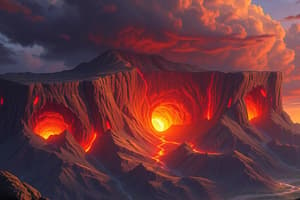Podcast
Questions and Answers
What are the three most common carbonate minerals mentioned in the text?
What are the three most common carbonate minerals mentioned in the text?
- Quartz, Feldspar, Mica
- Calcite, Aragonite, Dolomite (correct)
- Hematite, Magnetite, Limonite
- Halite, Gypsum, Anhydrite
Which mineral is primarily associated with ooids?
Which mineral is primarily associated with ooids?
- Gypsum
- Quartz
- Feldspar
- Aragonite (correct)
What is the primary texture associated with microcrystalline calcite?
What is the primary texture associated with microcrystalline calcite?
- Clay minerals
- Sparry calcite
- Ooids
- Micrite (correct)
What are the two main origins of sparry calcite (spar)?
What are the two main origins of sparry calcite (spar)?
What is the primary difference between limestones and dolomites?
What is the primary difference between limestones and dolomites?
What are the two main types of carbonate grains mentioned in the text?
What are the two main types of carbonate grains mentioned in the text?
What size particles are associated with microcrystalline calcite (micrite)?
What size particles are associated with microcrystalline calcite (micrite)?
Which classification system divides carbonates into Mudstones, Wackestones, Packstones, Grainstones, and Boundstones?
Which classification system divides carbonates into Mudstones, Wackestones, Packstones, Grainstones, and Boundstones?
In the Dunham System, what type of rocks contain grains brought in from elsewhere?
In the Dunham System, what type of rocks contain grains brought in from elsewhere?
What type of porosity is typical of dolomites?
What type of porosity is typical of dolomites?
Which classification emphasizes the effects of interparticle and vuggy porosity on reservoir petrophysical characteristics?
Which classification emphasizes the effects of interparticle and vuggy porosity on reservoir petrophysical characteristics?
Which classification system helps identify, correlate, and map rock/stratigraphic attributes that covary with genetic porosity?
Which classification system helps identify, correlate, and map rock/stratigraphic attributes that covary with genetic porosity?
'How do I predict spatial distribution of these pore types' is a concern addressed by which classification system?
'How do I predict spatial distribution of these pore types' is a concern addressed by which classification system?
Flashcards are hidden until you start studying
Study Notes
Carbonate Minerals
- The three most common carbonate minerals are not specified in the text.
Carbonate Textures
- Ooids are primarily associated with the mineral calcite.
- Microcrystalline calcite is characterized by a micritic texture.
- Microcrystalline calcite (micrite) is composed of particles smaller than 4 μm.
Sparry Calcite
- Sparry calcite (spar) has two main origins: in situ precipitation and replacement of pre-existing minerals.
Limestones and Dolomites
- The primary difference between limestones and dolomites is their mineral composition: limestones are composed of calcite, while dolomites are composed of dolomite.
Carbonate Grains
- The two main types of carbonate grains are ooids and intraclasts.
Classification Systems
- The Dunham System classifies carbonates into Mudstones, Wackestones, Packstones, Grainstones, and Boundstones.
- In the Dunham System, Grainstones contain grains brought in from elsewhere.
- The Rock-Fabric Petrophysical Classification emphasizes the effects of interparticle and vuggy porosity on reservoir petrophysical characteristics.
- The Lucia Classification helps identify, correlate, and map rock/stratigraphic attributes that covary with genetic porosity, and addresses the concern of predicting the spatial distribution of pore types.
- Dolomites typically exhibit moldic porosity.
Studying That Suits You
Use AI to generate personalized quizzes and flashcards to suit your learning preferences.




